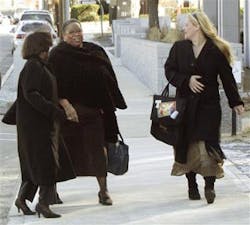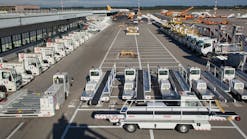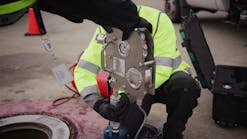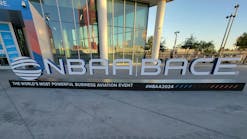CONCORD, New Hampshire_An African-American woman claims Southwest Airlines unfairly subjected her to its policy requiring large passengers to buy two seats because of her race, her lawyer said at the start of her federal lawsuit against the airline.
Nadine Thompson of Exeter, president of a cosmetics company, sued Southwest in federal court for discrimination in 2004, saying the company doesn't uniformly enforce its policy requiring obese passengers to buy two seats.
Thompson, who had flown on Southwest frequently, was on her way to a business conference in Chicago in June 2003 when she boarded her flight at Manchester International Airport. Not long after she took a seat in the back of the plane, put the arm rest down and buckled her seat belt, an employee she saw at the check-in counter asked her to get off, Thompson's lawyer, Neil Osborne, said in opening statements Tuesday.
She was told at the plane's loading bridge that she needed to buy a second seat for "her comfort and safety," Osborne said, even though no one was sitting next to her. At the time, the 5-foot-8-inch (1.73-meter) Thompson weighed between 300 and 330 pounds (135 and 148.5 kilograms), according to court records.
When Thompson asked for an explanation, she didn't get one. "It was never made clear to her that she was too big to fit in her seat," Osborne told the six-person jury.
She refused to leave and decided to return to her seat. An employee told her that if she left, Southwest will give her a refund, Osborne said. She declined, but became increasingly agitated and decided to leave - only to be met outside the plane by a few Southwest employees and two Rockingham County Sheriff's Department deputies. At that point, she started yelling at the group, at times using profanity.
"Did you ask me to purchase another ticket because I'm too fat to sit in the seat? Did you ask me to purchase another ticket because I'm a black woman?" Thompson said, according to court records.
Thompson, who got a refund, said she was humiliated and suffered emotional distress. "Southwest just asked me to get off the plane either because I'm too fat or too black or just a woman," she said to people as she was being led to the ticket counter, according to court records.
Thompson is not challenging the passenger seat policy itself, Osborne said.
"This is not a case about weight discrimination," he said. "This suit is about the inappropriate application of a policy in a discriminatory manner."
Garry Lane, a Southwest lawyer, said the airline's "customer of size" policy, introduced in 2002 in response to "squished customer" complaints and safety concerns about evacuations, wasn't written clearly at the time, that the employees made some mistakes in explaining it but they did not act out of racial bias.
The policy specifically didn't require Thompson to buy a second seat after she was allowed to board, but employees mistakenly had told her that she had to, Lane said.
"It has to be handled discreetly," Lane said of handling the passenger-seat issue. "It's part of the company's policy." The employees who spoke to Thompson made sure the loading bridge was clear of other customers before they asked her to come out, he said. Also, they had noticed her when she boarded the plane, but found it difficult to judge if she needed to buy another seat without seeing her sit down, he said.
The policy states that a customer of size is someone who can't sit in a seat without having the armrest raised and is sitting on part of the seat next to him. Lane said the Southwest employees will testify that they saw the armrest up most of the time and that Thompson was sitting on part of the adjacent seat.
Lane said none of the workers ever shouted at Thompson, used profanity or touched her. The deputies, who handle security at the airport, did not handcuff her and helped her make flight arrangements to Chicago via another airline, he said.





